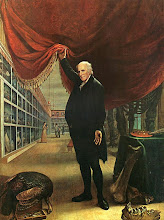- D.H. Lawrence, Chapter 5 of Studies in Classic American Literature
- Robert Jewett and John Shelton Lawrence, "Captain America Takes on Iraq"
- Rudyard Kipling, "The White Man's Burden"
Thursday, May 8, 2008
Useful texts for History 4004 final essay questions
Here are links to a couple of texts that I quote or allude to in the integrative essay questions that will be handed out in class today:
Wednesday, May 7, 2008
Did Spider-Man get the U.S. stuck in Vietnam? (Just kidding. Sort of. Green Lantern may have been involved, too.)
Here is a another thought about the "power and responsibility" theme developed most explicitly in the Spider-Man stories of the 1960s. Spider-Man and the most of the rest of the Marvel Universe were products of the Kennedy-Johnson era, and while we remember that as a time of great liberalization in domestic policy, it was also the Cold War's deadliest phase. Just as Spidey was debuting, American leaders launched a massive military campaign, costing many thousands of American and Vietnamese lives, to prop up a corrupt, unpopular government (and thwart of the completion of the country's anti-colonial revolution) in the name of saving a faraway land from the evils of communism. I am referring to the escalation of the U.S. war in Vietnam. Were the new superheroes of the 1960s part of the same mentality? Was the superheroic ideal really altruistic and self-sacrificing or just a self-serving and self-deluding excuse for getting our way by force?
It may be helpful to compare and contrast Spidey's "power and responsibility" mantra with the more explicitly Cold War-oriented Green Lantern Oath.
It may be helpful to compare and contrast Spidey's "power and responsibility" mantra with the more explicitly Cold War-oriented Green Lantern Oath.
Monday, May 5, 2008
Liberal comics of the 1960s: Power and Responsibility
Below you should see two panels that form more or less of a mission statement for the most beloved and influential superhero comics of the 1960s. Based on what you have read, how did comics reflect the politics of the Kennedy era, and after? What were (and are) their strengths and limitations as political and social documents of the time? (History 4004 students can post answers below for discussion credit.)


Subscribe to:
Comments (Atom)




